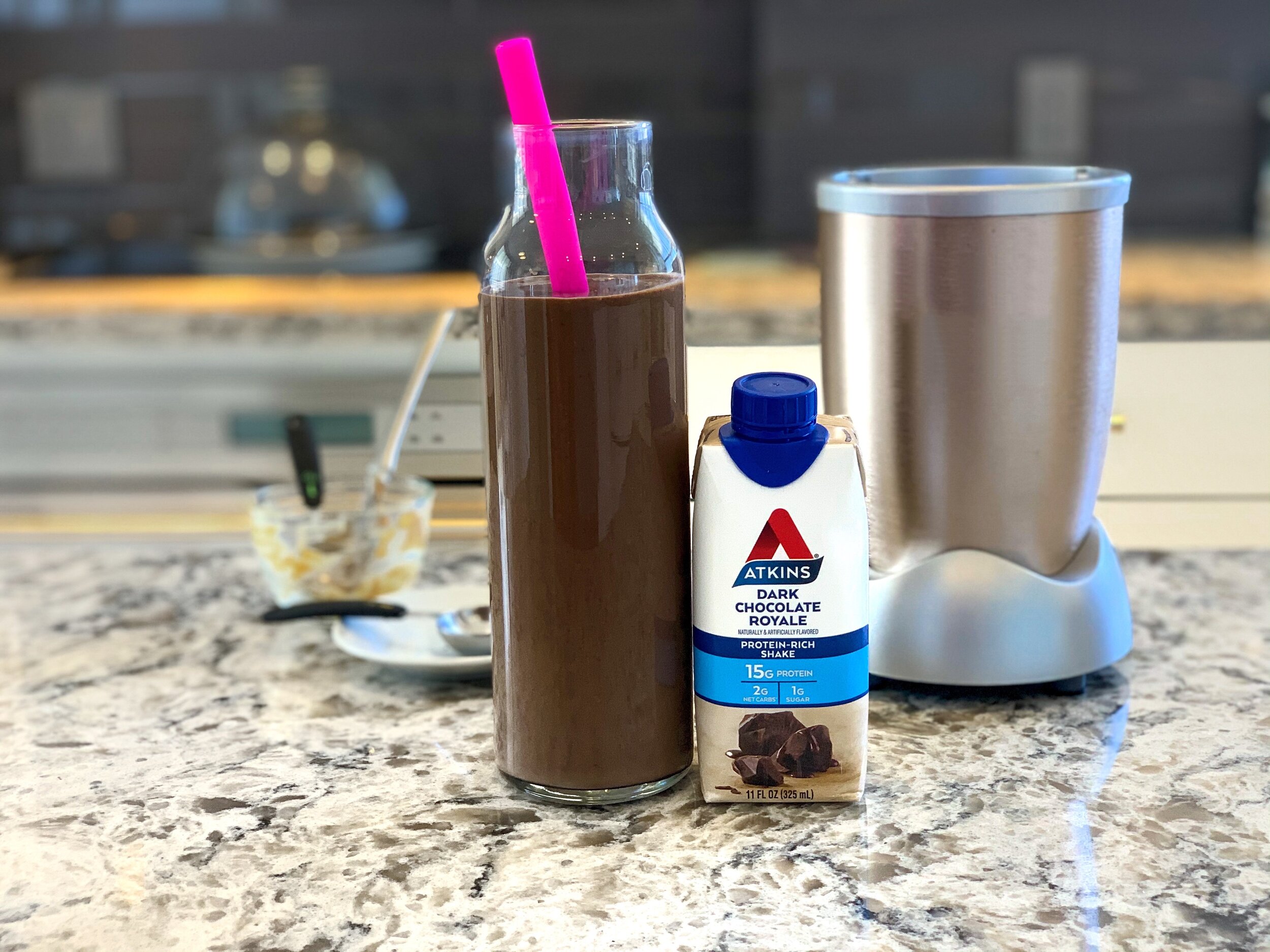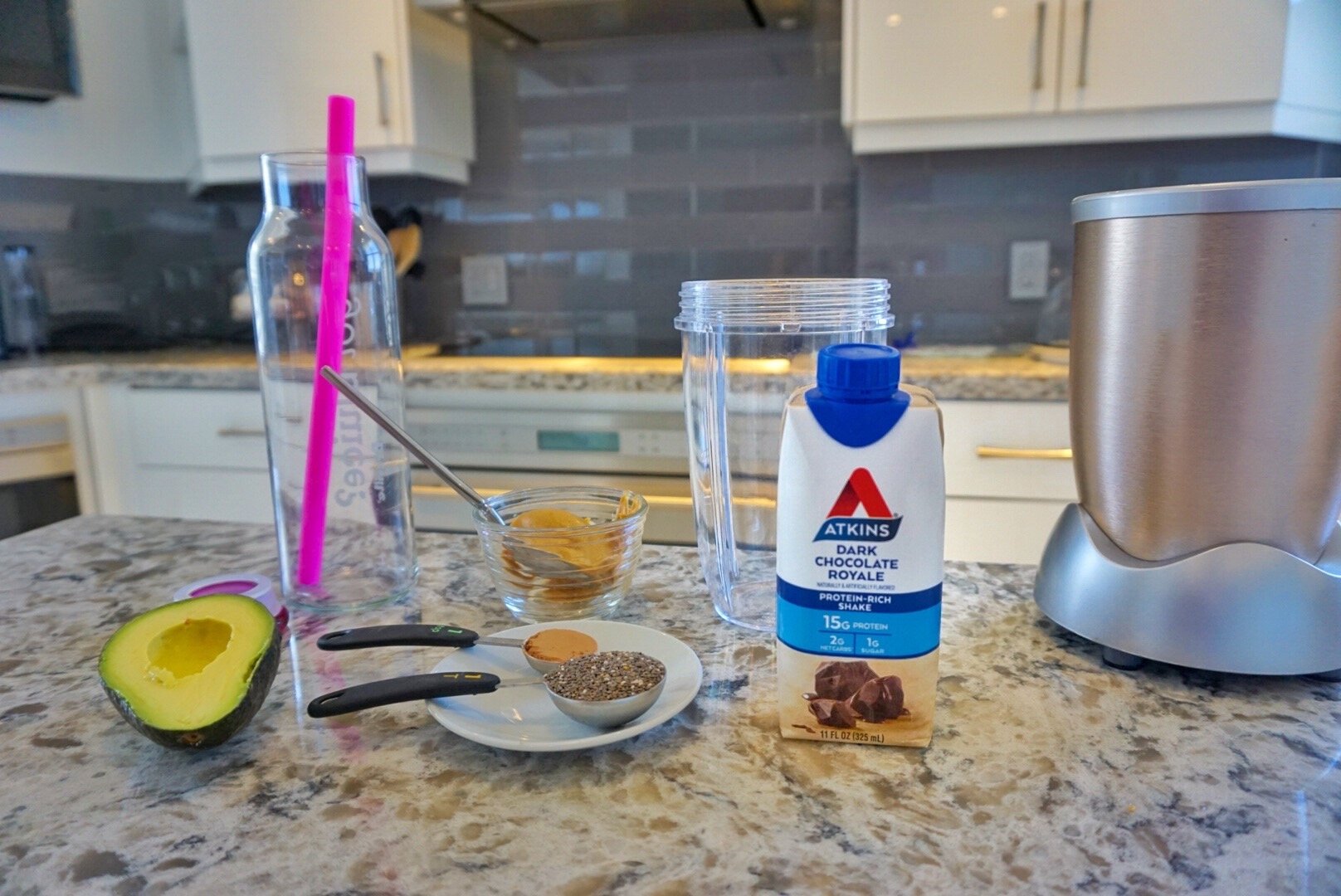The worst part about getting injured as an athlete is the thought of the amount of time it will take to get back to our previous fitness level. In order to come back to your healthiest self in the shortest time frame possible, you may want to include a nutritious diet as part of your rehab program. Continue reading to learn why and how to quickly get back to into shape.
Read moreStaying Happy & Nourished During Isolation
featuring Atkins
Sponsored by Atkins. All opinions are my own.
Working from home has its positives—you have a flexible schedule, can spend the entire day in pajamas, and can usually pause your work to squeeze in an errand or workout without a problem. It also has its downsides, though, especially when you are not only stuck at home during the workday, but also at night and the weekends. This is the case for everyone right now during the COVID-19 crisis we are dealing with. It was hard to get excited about working from home a couple of months ago at the start of this pandemic since the death toll was continuously rising every day. At the same time many people found it hard to stay consistent with a schedule being at home almost 24/7.
For me, it’s been a good eye-opener to be grateful for my health and the security of my family. I’m even more thankful now for the ability to run during this time, since gyms and other fitness classes have been canceled. Running brings me joy, but in order to run well and improve my performance in the sport, I need to eat well. Most of us know this does not come easy when you are home all day! I have a major sweet tooth and I’m living with family right now who love to keep desserts in the house, so you can imagine how hard it’s been to stay away from too many treats! Luckily I have gotten into the habit of managing my sweet tooth while still staying satisfied and nourished for my running goals.
Protein-Focused
Athletes know how important it is to get enough protein. It’s the nutrient that plays a significant role in muscle repair. Protein keeps you feeling full, too. It’s a good idea to include a serving at every meal, so you are less likely to overeat. The most important time to have protein is immediately after exercise. Hard runs call for my favorite optimal protein meal—a dark chocolate peanut butter smoothie! It’s a quick and easy recipe using my go-to shake from Atkins. The Atkins Dark Chocolate Royale is my favorite flavor but I’ve also made this smoothie with the Atkins Mocha Latte and Creamy Vanilla, and it’s just as satisfying! It just takes a handful of ingredients and a few minutes so you don’t have an excuse to skip out on your post-workout refueling!
How to Make the Dark Chocolate Peanut Butter Smoothie
Ingredients:
· 1 Atkins Dark Chocolate Royale Shake
· ½ ripe avocado
· 1 Tbsp creamy peanut butter
· 1 Tsp cocoa powder
· 1 Tbsp chia seeds
Mix all ingredient together in a high-speed blender with a few ice cubes, pour, and enjoy!
It doesn’t get easier than that! Most people find the use of an avocado in a smoothie to be weird, but since it’s relatively flavorless, it’s just meant to add thickness and creaminess. It basically replaces the use of a banana and makes it a perfect option if you are looking for a low sugar recipe. That’s the best part about this smoothie recipe—it’s low carb, so you can have it at any time of the day. It’s also a great option for those of us that crave something sweet late at night. Atkins shakes also have just the right balance of healthy fats, fiber, and key protein to keep you satisfied and your energy levels steady. I’ve been enjoying these shakes as part of my afternoon snack, but ever since adding them into my post-workout smoothie, I’m enjoying them even more!
Quarantine Happy
The majority of people sitting at home are struggling to stay content with their day-to-day lives. You hear all over social media how this is a great time to find a hobby at home or start a new venture, but when you haven’t been succeeding at productivity, it brings on a sense of discouragement. This should not be the case! It is actually OKAY to not be coming out of this pandemic with a new sense of self. I believe we should be doing what we want whether we are in quarantine or not—if you want to just sit around and relax and not worry about productivity, that’s just fine!
Rather than taking up a new hobby or starting a new project, I’m focusing on the aspects of my life I actually enjoy and do more of them with the extra time I have. This means I am following a more structured running program, getting in and sharing the workouts I love with my community, and cooking more every day. I can’t come up with any excuses to get out of my current and regular health routine, and I am happy to say Atkins truly has made meal prep, snacking, and refueling after workouts much easier and more enjoyable during this stressful time.
How Many Calories Do Runners Really Need?
Several factors go into being able to improve your performance as a runner. Consistent training with the right mix of speed work, long runs, and easy runs are at the top of the list. Rest and cross training must also be incorporated to recover properly and be prepared for the hard sessions to come. Nutrition plays a large role in performance, as it is what gives us the energy we need to actually perform and to do it well. Consuming the proper amount of carbohydrates and proteins is the key to sustaining energy levels while making sure to include other key nutrients like iron and vitamins.
You may have been in the situation where you do well during training for a bit but frequently struggle to hit several workouts in a row. This is usually a sign that you are not eating enough. As volume and intensity increases during training cycles, the number of calories your body requires increases as well. Even if you are on top of your nutrition game, it is easy to not meet your recommended calorie intake. Not eating enough calories can leave you fatigued on every run and increase your injury risk. But what is the right amount?
Calorie Intake
The right amount of calories a runner requires will depend on age, sex, weight, and activity level. This means it may be necessary to consume a fluctuating amount each day of the week since the intensity and length of runs and other workouts vary. The recommended daily calorie intake for a sedentary adult male ranges from 2200 to 2600 calories. For females, the range is 1800 to 2000 calories. Therefore some distance runners may need close to 3000 or more calories most days of the week to maintain their weight and energy levels. This may seem like too much, especially to women, but it is what is necessary if you want to perform your best and not risk getting injured.
Weight Loss & Training
If you currently are overweight or obese, then a lower calorie intake is ideal until you reach your goal weight. This should be done carefully, as cutting calories too low can result in limited energy. This will only lead to having to skip workouts and not be able to run your hardest. Having too little calories may also lead to muscle loss, which is what powers us through our workouts. Therefore if weight loss is a goal when training for a race, then it should be done gradually. Unfortunately, it is safest to plan an extremely slow weight loss of about a half pound per week.
Calorie Requirements Equation
Although calorie calculators you find online are used to get an estimate of the number of calories you need, it is usually in the ballpark of the right amount. The Harris-Benedict equation is a popular formula used to estimate your needs and takes into account your current activity level.
BMR for Men: (10 x weight in kg) + (6.25 x height in cm) – (5 x age in years) + 5
BMR for Women: (10 x weight in kg) + (6.25 x height in cm) – (5 x age in years) – 161
BMR is your basal metabolic rate, which is the number of calories your body requires in order to function properly. Once you calculate your BMR with this formula, you can multiply by the different values according to daily activity level.
For men and women:
Sedentary/little to no extra activity: BMR x 1.2
Light exercise 1-3x/week: BMR x 1.375
Moderate activity 3-5 days/week: BMR x 1.55
Very active 6-7 days/week: BMR x 1.725
Hard exercise/physical job (2x/day training): BMR x 1.9
This method is a good way to determine how many calories you should have on each training day, since some runners train twice a day a few times per week, but take a full rest day as well. Calorie requirements will be very different for each of these days.
Even with the above formula, the calorie requirement calculation can be wrong—either too high or too low. Everybody is different and some runners burn more calories per hour than others. Fitness levels, genetics, and present medical conditions can impact your calorie-burning rate. A more accurate test is one where you sit for ten minutes with a mask over your face and your breathing is measured to determine how much oxygen you use at rest. Whether you use this method or the formula above, many times it is all about trial and error. It is best for runners to eat more than they think they need at first and see how their body responds rather than under eating to see if it is good enough. You do not want to risk getting injured or wasting too many weeks not making progress due to not eating enough.
Types of Calories
Once you understand your individual daily calorie requirements, then it is important to fuel your body with the right types of calories. Limiting “empty calories” is key as these are considered calories with no nutritional value. Most packaged snacks, candy, soda, and chips are in this category. Runners should focus on getting the majority of their calories, at least 60%, from high-quality carbohydrates in order to supply the muscles with enough glycogen. The other 40% can be divided evenly between lean proteins and healthy fats. Proper fueling and hydration practices are necessary for performance improvement, injury prevention, and for an overall healthy body.
Sources
Benjamin I. Rapoport , Metabolic Factors Limiting Performance in Marathon Runners, Journal, Dec 26, 2019.








